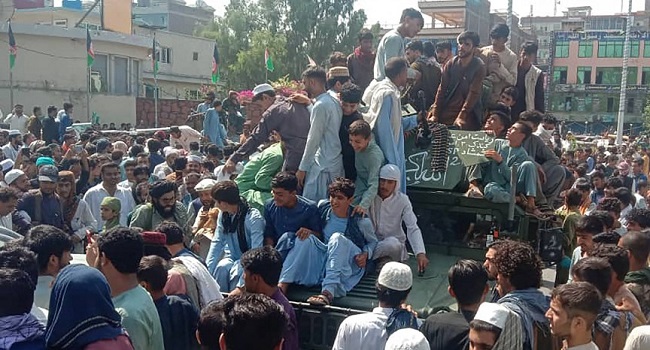Refugee charities on Tuesday urged the government to set targets on the number of people it aims to settle in Britain who have fled from Afghanistan.
Prime Minister Boris Johnson is expected to unveil a new scheme for incoming Afghans who are fleeing the nation after the Taliban launched a takeover.
- Unilorin rape murder: CCTV captures suspect withdrawing money from victim’s account
PIB: Petrol price remains N162 a litre, cooking gas prices to drop – FG
A Number 10 spokesperson described it as a “bespoke” scheme, but further details are yet to be released.
It has been reported that it would be based on the Syrian Vulnerable People’s Resettlement Scheme, a programme that was set up in 2014 with an aim to help give new lives to people who fled Syria after the outbreak of war.
The scheme helped around 20,000 Syrians settle in the UK.
Beth Gardiner-Smith, chief executive of Safe Passage International, said the Government’s intentions “must be backed by clear, ambitious numerical targets.
“We are calling on the Government to commit today to resettle at least 20,000 Afghan refugees over the next two years, in addition to their emergency relocation programme.
“This commitment should go hand in hand with a pledge of a long-term global resettlement scheme, which helps an additional 10,000 refugees a year.”
Robina Qureshi, director of Positive Action in Housing, said “we should not forget that there are thousands of Afghan asylum seekers already in the UK who are unable to build a life because they are still waiting for their asylum claim decided upon.
“We are therefore calling on the Prime Minister to recognise the plight of Afghans already here and grant them asylum and not to differentiate between those who arrived by boat, lorry or other ‘irregular’ means.”
After the war broke out in 2001, the British government launched a scheme called the Gateway Protection Programme which aimed to help home refugees from several different countries across the globe, not just Afghanistan.
They included taking people from Somalia, the Democratic Republic of the Congo and Ethiopia.
It was operated in partnership with the United Nations High Commissioner for Refugees (UNHCR) and was co-funded by the European Union.
Until March 2005, people granted asylum were given indefinite leave to remain.
However, since August 2005, all refugees other than those arriving in the United Kingdom under managed migration resettlement schemes such as Gateway have been granted five years’ limited leave rather than indefinite leave to remain.
At the end of this period, they are entitled to apply for settlement.
In 2014, the Government launched the Vulnerable Persons Resettlement Scheme (VPRS) which was aimed at helping those with the greatest need, including people requiring urgent medical treatment, survivors of violence and torture and those most at risk.
It was expanded a year later as the Syrian Vulnerable People’s Resettlement Scheme after the outbreak of the war.
In 2020, the Government combined the pre-existing schemes into one global programme, called the UK Resettlement Scheme.
However there is an entirely separate programme for Afghan interpreters and people who have worked with the UK in Afghanistan.
It is called the Afghan Relocations and Assistance Policy (ARAP) and launched in April.
Under the policy, any current or former locally employed staff who are assessed to be under serious threat to life are offered priority relocation to the UK regardless of their employment status, rank or role, or length of time served.
Prior to this, there was a scheme established in 2012 which gave ex-gratia redundancy payments and offered resettlement to locally employed civilians in the country after Britain announced it was withdrawing troops from Afghanistan.
Both schemes were widely criticised among MPs and revisions were made in 2018, and again in October 2020.
The ARAP programme has now replaced the ex-gratia payment programme.
Since 2013, the Government has resettled more than 3,300 Afghan staff and their families in the UK. (dpa/NAN)




